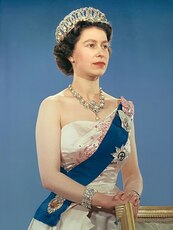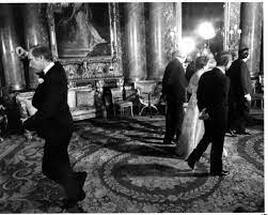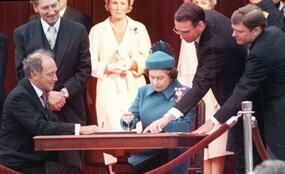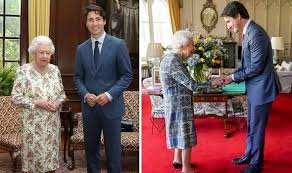 Official Coronation portrait, 1952
Official Coronation portrait, 1952 Because details about her life dominated the news for days after her death in September of 2022, there must be few who are unfamiliar (unless you actively choose to be) with her mostly exemplary life as well as with the unsquelchable (is that even a word?) stories about her dysfunctional family. But perhaps many are less familiar with her contributions to the decolonization of England's great Empire. Many of England's early decolonizations, like those of its European neighbors, went poorly to say the least. But then, Queen Elizabeth II wasn't on hand for those occasions. Because this story is about Queen Elizabeth II, and because I happen to be distantly related to Pierre and Justin Trudeau (along, I hasten to add, with probably thousands of others), I will concentrate on one of Britain’s classiest decolonization efforts, that of Canada.
By way of background, Canada was initially colonized by Europeans in the 16th century, first by the Spanish and the Portuguese and later by the French and the English. These two nations were in a state of perpetual conflict, with dominance seesawing between the two, but in 1763 the British decisively took control with the signing of the Treaty of Paris, and Canada officially became a British colony. Since then, it has gradually inched its way to becoming a fully self-governing entity. In 1867 England reorganized three of its colonies into the Dominion of Canada, ending Canada's status as a colony though it lacked legal autonomy and a British governor-general continued to represent British interests. In 1931 England continued slow-walking Canada towards autonomy by bringing it into alignment with other Commonwealth countries—but retaining the ability to amend the Canadian constitution. So—almost there, but not quite.
 the famous "Pierre pirouette" photograph, taken in Buckingham Palace in 1977
the famous "Pierre pirouette" photograph, taken in Buckingham Palace in 1977 Now it is King Charles’s turn to keep England’s relationship with Canada warm.


 RSS Feed
RSS Feed